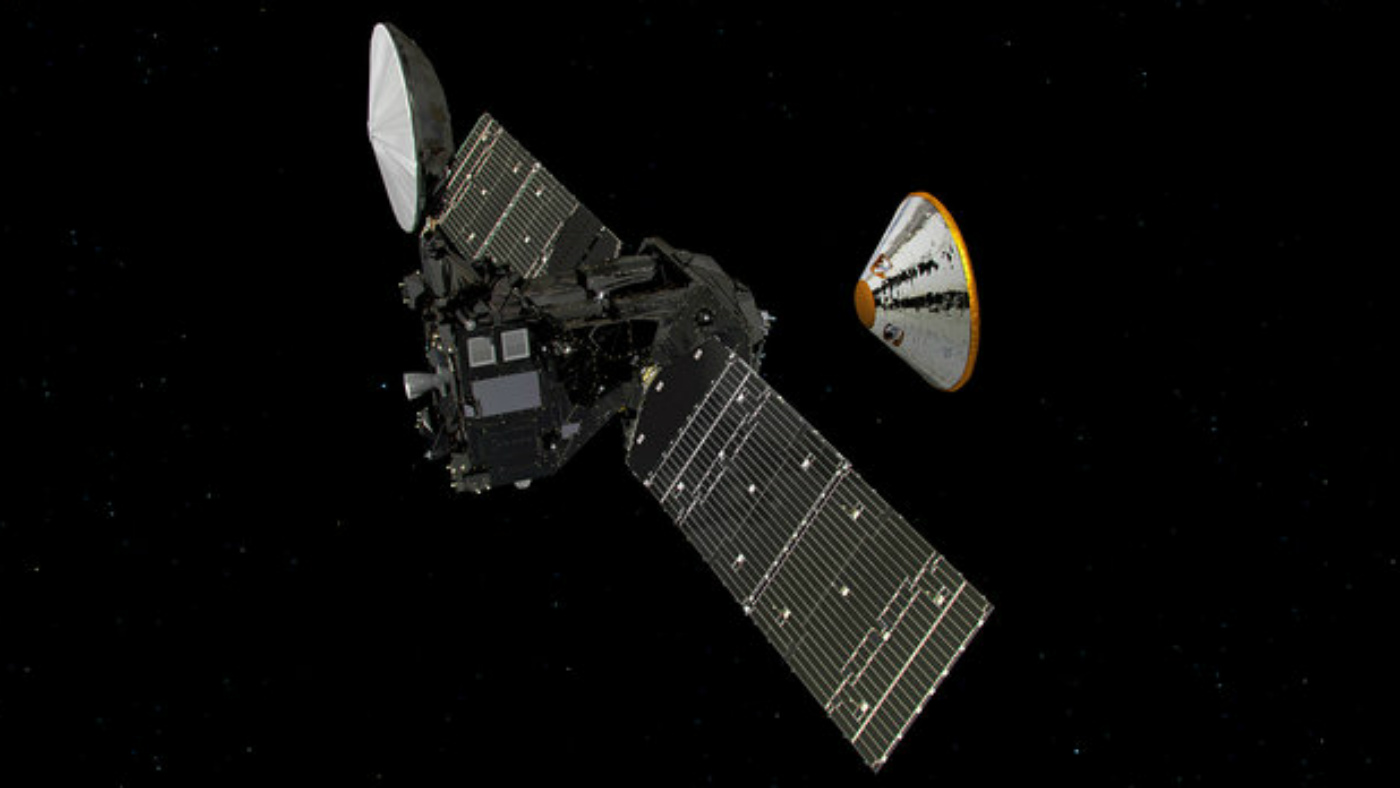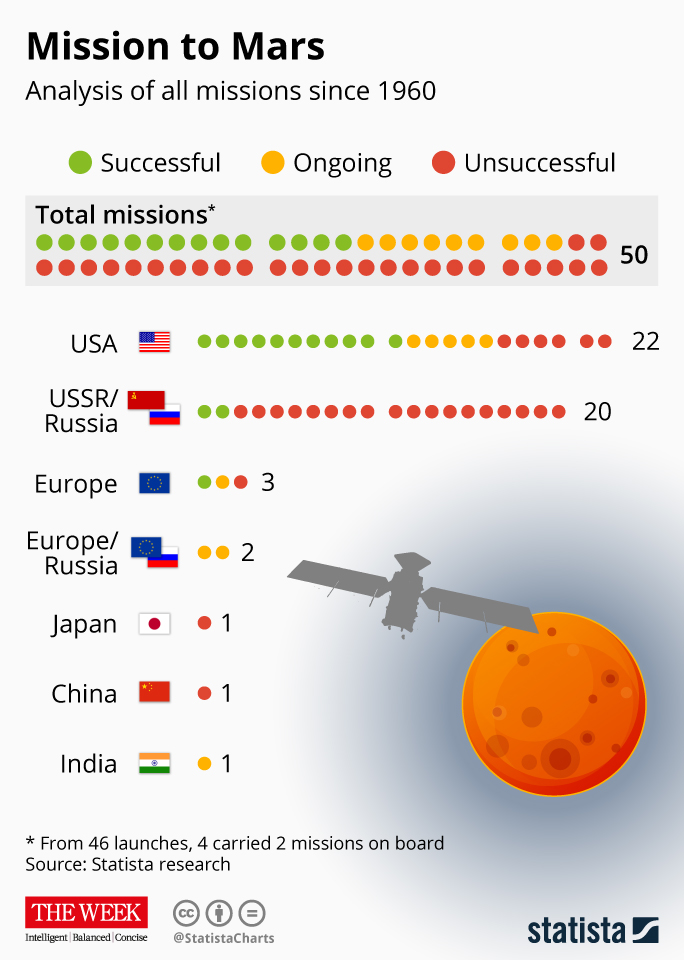ExoMars mission: Schiaparelli feared lost on Mars
European Space Agency waits for news from space probe after losing contact minutes before it was due to land

A free daily email with the biggest news stories of the day – and the best features from TheWeek.com
You are now subscribed
Your newsletter sign-up was successful
Scientists at the European Space Agency (ESA) are waiting for a signal from the Schiaparelli space probe after losing contact less than a minute before it was due to hit the surface of Mars.
"Grim-faced mission controllers peered at their monitors as the moment they expected the probe to call home came and went in silence", The Guardian says.
"It's clear this is not a good sign," said said Paolo Ferri, the head of mission operations at the European Space Operations Centre in Darmstadt.
The Week
Escape your echo chamber. Get the facts behind the news, plus analysis from multiple perspectives.

Sign up for The Week's Free Newsletters
From our morning news briefing to a weekly Good News Newsletter, get the best of The Week delivered directly to your inbox.
From our morning news briefing to a weekly Good News Newsletter, get the best of The Week delivered directly to your inbox.
Schiaparelli manager Thierry Blancquaert told AFP: "The lander touched down, that is certain.
"Whether it landed intact, whether it hit a rock or a crater or whether it simply cannot communicate, that I don't know."
Scientists have called in other satellites around the Red Planet to try and communicate with the craft, including a US satellite that "called out to Schiaparelli to try to get it to respond", says the BBC.
There was better news from the probe's "mothership", the trace gas orbiter, which was placed in an eccentric orbit around Mars and will spend the next few years testing gas levels, including methane, around the planet.
A free daily email with the biggest news stories of the day – and the best features from TheWeek.com
Methane holds a number of clues as to the state of Mars and "may even hint at the existence of life on the planet today", says the BBC.
ExoMars mission: Lander due to touch down on Mars
19 October
A probe is on course to become the first European spacecraft to successfully land on Mars, potentially opening the door to a future crewed mission.
The entry, descent and landing demonstrator module (EDM), also known as the Schiaparelli lander, is one of two spacecraft heading for the Red Planet as part of the ExoMars mission, a joint undertaking between the European Space Agency (ESA) and Roscosmos, the Russian space agency.
The second spacecraft involved in the mission, the trace gap orbiter (TGO) will not touch down but will attempt to enter the planet's orbit, where it will search for trace amounts of gas in the atmosphere.
This afternoon, scientists anxiously awaited a signal to confirm the Schiaparelli lander, which had entered a powered-down state to save energy, had awoken on schedule for its descent.
Finally, at 3pm BST, the ESA tweeted that the giant metrewave radio telescope, near Pune, in India, had picked up a signal from Schiaparelli.
It was on course to touch down at around 4pm BST, although confirmation of the mission's success is expected to take several hours, The Guardian reports.
Schiaparelli's complex landing procedure, which will be aided by a parachute to slow its fall, is the final phase of a journey which began seven months ago, when both spacecraft were launched on a Proton rocket from the Baikonur Cosmodrome in Kazakhstan.
The TGO and Schiaparelli successfully parted ways three days ago to begin their separate missions, which could ultimately pave the way to humans landing on Mars.
Schiaparelli's mission is to assess hydrogen levels under the surface of the planet that "could help pinpoint deposits of ice that later crewed missions can use as a water source", TechCrunch reports.

Infographic by www.statista.com for TheWeek.co.uk.
-
 Political cartoons for February 16
Political cartoons for February 16Cartoons Monday’s political cartoons include President's Day, a valentine from the Epstein files, and more
-
 Regent Hong Kong: a tranquil haven with a prime waterfront spot
Regent Hong Kong: a tranquil haven with a prime waterfront spotThe Week Recommends The trendy hotel recently underwent an extensive two-year revamp
-
 The problem with diagnosing profound autism
The problem with diagnosing profound autismThe Explainer Experts are reconsidering the idea of autism as a spectrum, which could impact diagnoses and policy making for the condition
-
 Epstein files topple law CEO, roil UK government
Epstein files topple law CEO, roil UK governmentSpeed Read Peter Mandelson, Britain’s former ambassador to the US, is caught up in the scandal
-
 Iran and US prepare to meet after skirmishes
Iran and US prepare to meet after skirmishesSpeed Read The incident comes amid heightened tensions in the Middle East
-
 Israel retrieves final hostage’s body from Gaza
Israel retrieves final hostage’s body from GazaSpeed Read The 24-year-old police officer was killed during the initial Hamas attack
-
 China’s Xi targets top general in growing purge
China’s Xi targets top general in growing purgeSpeed Read Zhang Youxia is being investigated over ‘grave violations’ of the law
-
 Panama and Canada are negotiating over a crucial copper mine
Panama and Canada are negotiating over a crucial copper mineIn the Spotlight Panama is set to make a final decision on the mine this summer
-
 Why Greenland’s natural resources are nearly impossible to mine
Why Greenland’s natural resources are nearly impossible to mineThe Explainer The country’s natural landscape makes the task extremely difficult
-
 Iran cuts internet as protests escalate
Iran cuts internet as protests escalateSpeed Reada Government buildings across the country have been set on fire
-
 US nabs ‘shadow’ tanker claimed by Russia
US nabs ‘shadow’ tanker claimed by RussiaSpeed Read The ship was one of two vessels seized by the US military